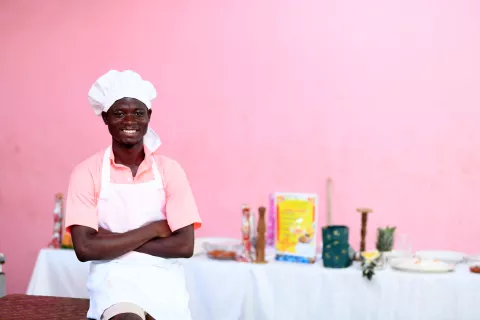Thirteen-year-old Efua* went to live with her aunt in Bongo, a rural district in the Upper East region of Ghana, far from her birthplace in Dormaa West District. Efua's father had asked her to stay with their aunt so that she could take care of her younger cousins. However, her father did not know that the aunt's 63-year-old husband, was abusive. He repeatedly violated Efua physically and sexually. Not knowing where and how she could seek help, Efua became hopeless, scared and depressed.
The Girl Child Officer from the Ghana Education Service (GES) and the District Commission of Human Rights and Administrative Justice (CHRAJ) received an anonymous report on Efua's case. Immediately, her case was referred to the Department of Social Welfare and Community Development (DSWCD) for urgent rescue.
Bongo District is one of the 160 districts implementing the Integrated Social Services (ISS) programme, supported by the United Nations Children’s Fund (UNICEF) and the United States Agency for International Development (USAID). "All the social welfare staff in our district have been already trained on how to assist vulnerable children and handle child protection cases, including sensitive cases, like child sexual abuse, in line with the best interests of a child principle, considering the age, gender and ability," said Mr. John Azam, the Head of Department of Social Welfare and Community Development in Bongo District.
Having a well-established case management system, coordination structure and the use of Inter-Sectoral Standard Operating Procedures on Child Protection and Family Welfare allowed a swift intervention to support Efua. The Department of Social Welfare and Community Development (DSWCD) and the Police quickly facilitated preliminary investigations and assessments. The DSWCD staff also accompanied Efua to the hospital for essential medical check-ups and treatments. Other partners of UNICEF such as the Abuse Relief Corp, an NGO based in Kumasi, supported her by providing financial assistance to continue medical treatment and counselling services. "All was done cooperatively, efficiently and effectively, thanks to ISS. It has really boosted our level of professionalism and our ability to help a child like Efua," explained Mr. Azam.
To help Efua with the legal process, officials from the Domestic Violence and Victims Support Unit (DOVVSU) of the Ghana Police Service provided legal aid support and referrals for medical forensics and psychosocial counselling. Judges and court staff who handled Efua’s case had prior training, with support from UNICEF, to handle cases of children as per the Child-Friendly Gender-Based Violence Courts - Operational Guidelines. These guidelines help the court staff to prevent child survivors from facing the perpetrators physically during the trial and minimize the risk of further trauma on the survivors. The perpetrator was arrested and later found guilty by the court. He was sentenced to 10 years imprisonment.
Meanwhile, Efua took temporary refuge in the Hope Children's Place, a licensed residential care facility, while the district social welfare staff contacted her parents to prepare reintegration. All steps of the case were entered into the Social Welfare Information Management System (SWIMS). Efua’s case was handed over to Dormaa West District, where she was then returned to her parents. To help Efua overcome the traumatic experiences, DSWCD staff conducted regular follow-up visits, provided counselling sessions, and referred her to education and youth services.
Today, Efua is living a happy life with her parents. She has been re-enrolled in school and enjoys childhood moments with her friends.
"I am finally living with my own parents, who are dedicated to protect and help me. Now I feel safer and will focus on staying happy and attend school,"
*Name has been changed to protect identity.


